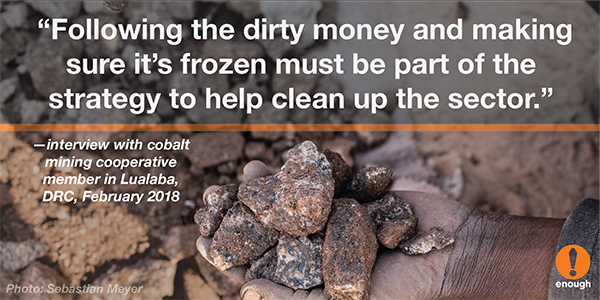Powering Down Corruption
Powering Down Corruption: Take Action to Support Transparency and Human Rights in Cobalt Supply Chains from Congo

Congo produced approximately 60 percent of the world’s cobalt in 2017, and with electric vehicle manufacturers and consumer electronics companies scrambling to secure their access to this critical material as demand increases, there is a nearly unprecedented opportunity for companies to engage proactively and continuously in dedicated supply chain due diligence—or for corrupt networks to make millions in a climate of scarce regulation and oversight.
Cobalt is mined on both large-scale and artisanal concessions in Congo, each presenting its own set of challenges. Industrial mining lacks transparency in several key areas of contracting, subcontracting, and joint venture disclosure practices. Artisanal mining in some cobalt mining areas has links to illegal and corrupt involvement of armed military actors, nontransparent documentation of production and export data, and human rights abuses such as child labor and hazardous working conditions. Connections back to President Joseph Kabila and his regime emerge in both artisanal and industrial mining.
Hundreds of millions of dollars went missing from Congo’s state-owned mining company, Gécamines, between 2011 and 2014, with direct ties from this missing money to deals with international copper and cobalt mining companies. The networks of corruption extend beyond Congo’s borders to foreign commercial facilitators such as key Kabila financier Dan Gertler, whom the U.S. government sanctioned in 2017 for generating illicit wealth, mainly from corrupt and opaque mining deals in Congo. And several industrial cobalt and copper mining companies operating in Congo are currently under investigation in the United States, the United Kingdom, and Canada for their potential role in corrupt activities.
Companies should actively incorporate transparency initiatives into their sourcing protocols in order to address the corruption and human rights abuses linked to cobalt production. In particular, companies in the automotive and consumer electronics industries, should:
- Conduct thorough and consistent due diligence and public reporting, with attention to corruption-related risks.
- Collectively, through relevant industry associations, visit cobalt mine sites to ensure compliance and reinforce their prioritization of transparency and anticorruption initiatives.
- Use supply chain leverage to increase contract and subcontract transparency.
- Contribute to benefits-sharing and livelihoods programs and comply with internationally recognized frameworks for obtaining and maintaining consent to operate from host communities.
- Require producers and suppliers to fully report on which minerals are artisanally mined on their concession or in their possession, as the case may be.
If managed transparently and responsibly, cobalt revenues could help alleviate poverty in Congo and be a backbone for development. Especially as Congo implements a new mining code that considerably raises royalties on cobalt, a responsible and transparent trade could, in theory, have nearly unprecedented social and development benefits. To complement these, companies using cobalt to propel forward renewable energy technologies such as electric vehicles and rechargeable batteries could also share the benefits of these technologies with Congo’s mining communities.
About the report
To learn more about how cobalt is linked to corruption and human rights abuses in Congo, and what can be done to encourage a transparent trade, click on the links to the right to read Enough’s report, “Powering Down Corruption: Tackling Transparency and Human Rights Risks from Congo’s Cobalt Mines to Global Supply Chains,”and corresponding activist brief.
Sign The Petitions
Sign these two petitions to auto and electronics companies, which the Enough Project will then deliver to company representatives.
Share the findings
Cobalt helps drive #electricvehicles and charge cell phone batteries, but it also powers corruption in Congo. Companies should lead on taking steps to address corruption, transparency, and human rights in their supply chains. Learn more and take action: www.enoughproject.org/cobalt

